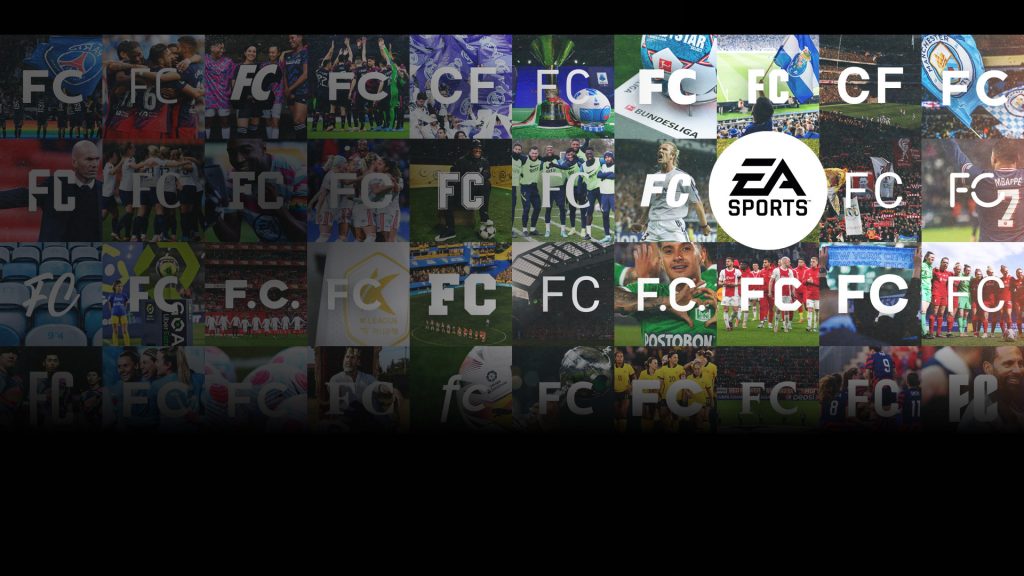
Last May, FIFA and EA revealed that their partnership was coming to an end. The news sent waves across the already complicated landscape of exclusivity rights in digital football, a gaming niche long dominated by the decades-long war between the FIFA series and Konami’s eFootball (formerly Pro Evolution Soccer).
Shortly after the divorce — which reportedly resulted from FIFA seeking to more than double its $150m (~£119m) licensing fee — EA announced that the game would be renamed EA Sports FC, and would replace the yearly FIFA release, likely starting around September 2023 (based on previous launch dates).
We still know nothing of the technical side of the game, and likely won’t until EA’s preview, usually held in July. But there’s plenty of implications already for the US gaming giant. One of which is: what will happen when thousands of fans and parents search online this Christmas for the latest FIFA?

As a result, EA has begun a marketing campaign to put its new brand name into as many minds as possible. Part of that campaign was an activation involving the inauguration of a new football pitch for a primary school in London dedicated to two legends of the sport: Ian Wright and David Rocastle. Called the Rocky and Wrighty Arena, this new facility was a collaboration between the Premier League Foundation and EA — which put the EA Sports FC brand everywhere.
“We believe it’s essential to instil love for the sport and video game fandom at a young age, and we want to facilitate access for young people by creating a safe space where they can play football and cultivate what has become a lifetime passion for many,” David Jackson, VP of Brand at EA Sports FC, told Esports Insider.
What many esports industry observers are wondering, however, is how the competitive landscape around EA’s title is going to change — especially in the European market where the competition is fierce.
For starters, GOALS, a new football simulator that will make its debut in the next two years, has opted for the free-to-play formula to entice player acquisition. Konami’s eFootball has done the same. These competitors will hope to stake the claim that their esports ecosystems are truly open — more so than EA Sports FC, whose base game will cost ~£59.99 if the FIFA model stays the same.
EA remains anchored to the idea of a yearly boxed product release and sees no reason to back down, though things could change in the future. “Our community didn’t tell us that we need to change our business model, but if their opinion changes in the future, we are not closing any doors,” Jackson said.
With the divorce from FIFA, EA has lost a few things on both the entertainment and competitive fronts. “We lost the intellectual property of the World Cup and, obviously, the FIFA Global Series,” Jackson said.
“However, the end of the partnership has opened the door to many new possibilities.” The EA Sports FC executive explained that FIFA held a lot of sway over the competitive formats EA could utilise, as well as how certain other things were regulated on the esports front. A clean slate may therefore mean EA could change up its approach.
FIFA, the game franchise, is a behemoth, and there’s no reason to believe that this change of branding will have a serious impact on the hardcore player base. As of April 2023, EA’s title has eight times the concurrent and average players of Konami’s eFootball, and GOALS is a couple years away.
What may be concerning for organisations and players is the new branding when it comes to esports. Will people tune in to watch the FC Clubs Cup? National leagues like the ePremier League and the eSerie A will likely maintain their audience thanks to the existing clubs that take part, but will fans of virtual football flock to EA’s new esports circuit?
Retention of dedicated fans and players will be a major obstacle for EA. Jackson and his team emphasised in our interview how much the company cares about player feedback. This has not always been the case — EA has received plenty of criticism over the years for controversial changes, like the previous goalkeeper rework that ran completely contrary to what players demanded. Yet with recent editions, the company has seemingly understood a need to listen to what both casual and professionals need.
Jackson noted that the complicated licensing landscape also shapes their decisions. “We [EA] have two audiences: the players and the partners,” he said. “We have more than 350 licences, from entire leagues to single players, and now we have the freedom to build our brand as we please.” Now that it has lost the FIFA branding, EA will likely put its marketing money into getting the most famous cover stars to make the game identifiable with the most popular teams in the world.

With a fresh start also comes fresh ambitions in the mobile esports ecosystem, an ecosystem that is often undervalued in the West — a reality Jackson wants to change. “From consoles to mobile, all competitive aspects of digital football have been considered to forge our new platform. Our approach has been to listen to our pro players to understand what they would like to see implemented and what benefits them the most.”
There’s something even for content creators in the new EA Sports FC. Exact details are limited at the moment, but we know that EA is working on a new initiative. “Both content creators and pro players have asked [for them] to be visible within the competitive platform to build their content and their story within it, and we are looking into that,” Jackson said.
Much of what EA Sports FC has in store, and how that will affect its esports scene, has yet to be revealed. Things are still in development, and nothing is sure to make it into the final game. But the few hints EA has revealed point to a strategy of making the most of its new-found independence from FIFA — hopefully to the benefit of esports.
